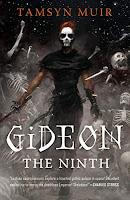 With that in mind… what even is genre? A great way to think of it is a compass (many thanks to Pierce Brown for this analogy). Genre points you in the general direction of things you’re looking for. You want to head south-west? Just keep going that way. You want to find horror novels? They’re all over there.
With that in mind… what even is genre? A great way to think of it is a compass (many thanks to Pierce Brown for this analogy). Genre points you in the general direction of things you’re looking for. You want to head south-west? Just keep going that way. You want to find horror novels? They’re all over there.
And that leads us to another good way to think of it, maybe an even more relatable one. Where would my book get stocked in the bookstore? Don’t think about getting misshelved or getting featured on that best-sellers endcap. No excuses, no avoiding the question. Picture your favorite store and decide where would it be shelved in that store.
My point being… life finds a way.
No, sorry, my point is that in both cases, the genre gave people a good idea what they’d find when they opened the book. Post-apocalyptic zombies. Superheroes.
Science-Fiction—this is when my fictional elements have a rational, scientific explanation behind them. They don’t need to be explained(although hard science fans love it when you can), but they need to fall within a range of believability.
Science-Fantasy—This is when my story elements are hypothetically grounded in science, but (to paraphrase Arthur C. Clarke) they’re so far advanced they’re beyond all possible understanding and essentially magic.
Urban Fantasy—A subgenre I thought was worth mentioning. Here we’re still tossing some of the reality-rules out the window, but we’re specifically doing it in a modern (or near-modern), real-world setting, often with more modern technology alongside it.
Horror—Might sound obvious, but many aspects of these stories involve fear for both the characters and the reader. Depending on my exact subgenre, that fear can have many different causes and intensities.
Romance—again, might sound obvious, but in romance most of the elements revolve around two characters developing a relationship despite various challenges. There may or may not be a sexual element (of varying explicitness) again depending on my subgenre.
Mystery—This is when the main thrust is trying to find answers to a problem—very often (but not always) involving a crime of some sorts. Another good rule of thumb for mysteries—they tend to center around something that already happened. The mystery is past tense.
Thriller—Somewhat similar to mysteries, this is when the plot elements involve a current, ongoing problem. Because of this, thrillers also tend to have a strong action component and fast pacing. The rule of thumb—thrillers are happening right now.
That’s not all possible genres (not even close), and there are sooo many sub-genres, but it’s enough to get you started.
All of this leads me to my final bit of advice, which kind of ties back to that earlier post. If I had to give a one or two sentence elevator pitch about my story, what would be in that pitch? What would I be focusing on? Would I be talking about space elevators and moon colonies, or would I be emphasizing the zombie hordes rising from their graves? Remember—I’ve only got two sentences, and they can’t be run-ons. Elevator pitch. Very fast, very clear.
 Consider Twilight. It has vampires and werewolves and more than a few deaths… but it’s not a horror story. It barely counts as urban fantasy. The thing we’d emphasize in our elevator pitch is the high schooler who falls in love with a vampire. It’s a romance novel. Supernatural romance if we want to start focusing down.
Consider Twilight. It has vampires and werewolves and more than a few deaths… but it’s not a horror story. It barely counts as urban fantasy. The thing we’d emphasize in our elevator pitch is the high schooler who falls in love with a vampire. It’s a romance novel. Supernatural romance if we want to start focusing down. And that’s all I’ve got to say about genre. Unless anyone has any specific questions?
Next time…
 Well, in some beautiful, alternate world we all sheltered in place all through March and April, wore our masks for May, and now it’s perfectly safe for all of us to attend San Diego Comic Con next week! YAY!
Well, in some beautiful, alternate world we all sheltered in place all through March and April, wore our masks for May, and now it’s perfectly safe for all of us to attend San Diego Comic Con next week! YAY!
But in this world, alas, SDCC was cancelled because of folks who refused to do those things. There are still going to be some virtual events, though. I’m doing a panel on sci-fi writing next Friday at
And all this means that next time, I may revisit and revise my list of top B-movie mistakes.
So until then, go write.
And, c’mon… wear your mask.





